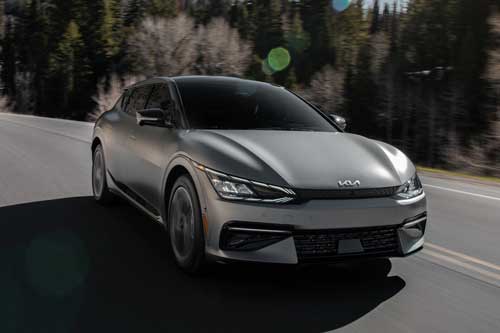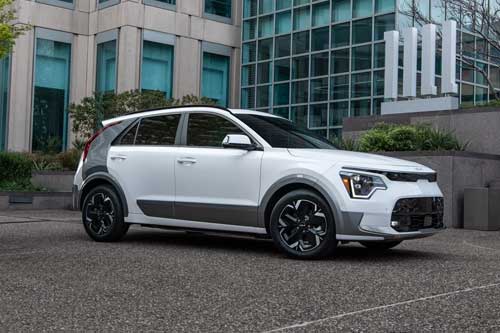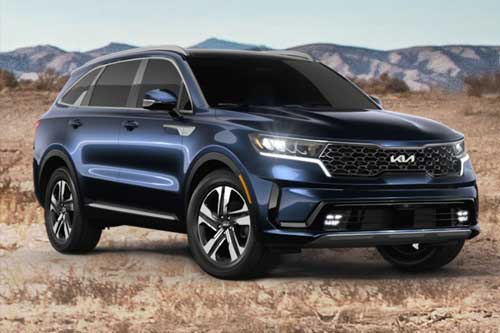|
|---|
Discover Your New Kia EV ( Electric Vehicle) in North Palm Beach, FL
Frequently Asked EV Questions:
EV Charging Questions
You can charge your electric car either at a dedicated charging station around town or from your home. Kia is partnering with ChargePoint to offer a ChargePoint Home Flex EV Level 2 Charger. This makes the home installation process simple so Kia EV drivers can easily charge up at home. If you have any questions about having the ChargePoint Home Flex EV Level 2 Charger installed in your home contact us below.
The cost of charging an electric car will vary by state. In addition to your location there are also other numerous variables. On average you can probably expect to pay somewhere around $0.20-$0.30 per kWhContact. Depending on the EV you drive you could expect a full charge to cost around $5-$10 on average. You may be able to save even more money by contacting your utility provider to let them know you're an EV driver. They may have EV home charging incentives for you that could include special utility rate plans to help lower your energy costs. In addition to your utility provider savings many Kia EV models come with charging incentives and credits. Contact us to see what vehicles are eligible.
This will depend on many factors like if the charger is a level 1 charger, level 2, or a level 3 DC Fast Charger (DCFC). In addition to the type of charger the model EV you are charging will also play a role. On average, many new electric cars will take somewhere around:
- Level 1: ~40hrs for full charge; Level 1 chargers typically provide ~3-5 miles of range for every one hour of charging*.
- Level 2: ~2-3hrs for full charge*
- Level 3: ~20-30min for full charge*
- Level 1 uses a 120V charger that plugs into a standard wall outlet.
- Level 2 uses a 240V charger, which you may be able to install in your home or find at many public stations.
- Level 3 uses a 480V DC Fast Charger, which are typically found in convenient locations along highways and parking lots.
More often than not your EV navigation system will show you where the nearest charging stations are. You can also use the Kia Access app to find nearby charging stations. Another resource is https://www.plugshare.com.
General EV Questions
An average electric car battery will typically last 10-20 years before needing replacement. Kia offers a battery capacity warranty of 10 years/100,000 miles for our electric cars.
The range of electric cars varies due to many key factors like the model, weight and size of the car, battery size, electric motor specification, your driving style, conditions, etc. Generally speaking, you can expect most modern EVs to have a range of somewhere around 200-300 miles* on a single charge. For example, the new Kia EV6 gets its power from a 77.4kWh high-density lithium-ion battery which gives it an EPA-estimated range of 310 miles*.
Electric cars often use lithium-ion batteries that can be a valuable source of recyclable metal according to the California Environmental Protection Agency.**
If your electric car battery runs out of power while you're driving then Kia's 24-hour roadside assistance can transport you and your EV to the nearest charging station or Kia dealer to get you back on the road as soon as possible. This is essentially the same as if you were to run out of gas in a non-electric vehicle, except with an EV you don't have to worry about additional maintenance issues that could come with running out of gas. And to help make sure you don't run out of juice in your electric car, Kia EVs are equipped with numerous features that help you manage your range. You can even use the Kia Access app from your phone to keep track of your vehicle's battery life.
A plug-in hybrid electric vehicle (PHEV) is a hybrid vehicle that uses a battery to power an electric motor and also uses gasoline to power its traditional combustion engine. The main difference between a PHEV and a regular hybrid vehicle is that a PHEV runs solely on its battery and electric motor until the battery is nearly depleted. When the battery is nearly depleted then the car will automatically switch over to its traditional gasoline powered engine. The battery of a PHEV can be charged using a wall outlet, the specified charging equipment, by its gas powered engine, or even through regenerative braking. Kia's PHEV lineup is headlined by the Kia Niro PHEV, Kia Sorento PHEV, and Kia Sportage PHEV.
Submit A Question
Make an Inquiry
* Indicates a required field




